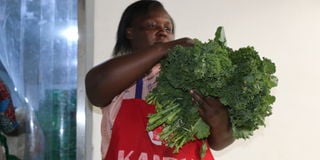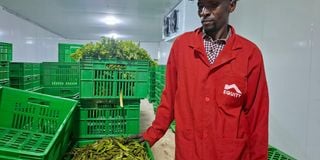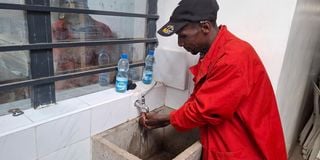Good news for vegetable vendors at Free Area fresh food Market

Traders sort their produce to store in the cold room at the Free Area fresh food market on July 31, 2025.
The installation of a solar-powered cold storage facility at the Free Area fresh food market has been a game changer for vegetable vendors. For years, they suffered post-harvest losses due to a lack of refrigeration.
However, since the installation of the cold storage facility, which was aimed at reducing food waste and improving produce quality, traders have recorded fewer losses and better profits.

Eunice Moraa, who has been selling vegetables at the Free Area fresh food market for more than a decade, inspects her produce outside the cold room on July 31, 2025.
“For the longest time, we would throw away vegetables at the end of each day because they wouldn’t last until morning,” says Eunice Moraa, a trader with more than a decade's experience.
“It was painful to see food going to waste when there are people out there who are hungry. But now, with the cold room, I can store my vegetables for up to three days and still sell them fresh," she says.
Ms Moraa says that before, she would bring only a handful of vegetables worth Sh1,000. If they stayed overnight, they would start to spoil and she would have to throw some away before she had even made a sale. Now, she has tripled her sales because she knows her vegetables will keep for longer.
“Before, customers would come back with negative feedback about the quality of the vegetables, but since the cold room was installed, my customers look forward to buying from me and the other vendors because we can now guarantee the quality of the produce,” Ms Moraa says.
The facility has 500 storage crates, pallets for heavy produce, a sorting table and a washing area. It is powered by electricity, but has a backup solar system to ensure uninterrupted operation in case of a blackout.

Gabriel Ndung’u, the chairman of the Free Area fresh food market inside the cold room on July 31, 2025.
Previously, the market generated up to eight skips of organic waste daily, most of which was from rotting vegetables. This has now dropped to just one skip thanks to the cold room and a waste recovery firm that collects unavoidable spoilage for composting and reuse in a circular economy.
Gabriel Ndung’u, the chairman of the market, says that there has been a shift in mindset since the cold room was installed.

Gabriel Ndung’u, the chairman of the Free Area fresh food market inside the cold room on July 31, 2025.
“Initially, we struggled to convince the traders that the cold room was not a fridge. Once it was installed, they confirmed that it indeed looked like their refrigerators. Once they were convinced, the next issue was how we would be able to maintain it in the long term. They agreed to pay Sh10 per crate,” he says.

Gabriel Ndung’u, the chairman of the Free Area fresh food market inside the cold room on July 31, 2025.
Ndung’u recalls how traders used to rush to sell everything in one day to avoid losses. Now, they can plan better, sell more calmly and reduce pressure on pricing.
“Even our customers can tell the difference in freshness and hygiene. It’s a win-win. As the first market in the county to have this facility, I’d like to encourage the county government to implement it in all the other markets so that other traders can enjoy the same benefits,” he says.


